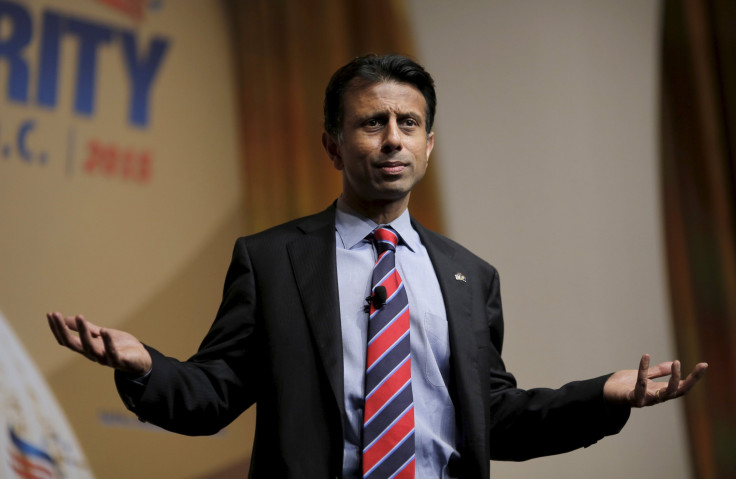Election 2016: Gov. Bobby Jindal Of Louisiana Joins The Fray

Gov. Bobby Jindal of Louisiana entered the wide field of Republican presidential aspirants Wednesday with a few distinctions. At 44, he’s one of the youngest Republicans vying for the nomination, he has executive experience as a governor and he is the first U.S. governor of Indian descent. Still, some longtime observers of Louisiana politics say that, should he make his way to the top tier, he may have some serious liabilities.
Jindal is coming in as a long shot for the nomination. A Real Clear Politics average of national polls over the last month placed Jindal far behind the leaders, with less than 1 percent of the likely Republican vote. His support in his home state also has been dwindling recently. A poll of Louisiana voters from last month showed that Jindal’s approval there was so low that even President Barack Obama polled better than he did. Obama lost the state by nearly 17 points in the 2012 presidential election.
I’m running for President of the United States of America. Join me: http://t.co/MmqB4kxpUq
- Gov. Bobby Jindal (@BobbyJindal) June 24, 2015But, in a field full of senators and political newcomers, having 'governor' on a resume could still be a good way to distinguish Jindal from some of the others on the campaign trail. He is expected to focus on his experience working with both Republicans and Democrats in Louisiana, the expansion of business in Louisiana during his time as governor, his adherence to a pledge not to raise taxes, and his education record as governor.
“I think he’s probably going to be stressing his executive experience and using that as a way to differentiate himself from some of his other competitors in the field that are thinking of running,” said Robert Hogan, a professor of political science at Louisiana State University. “Particularly people like [Sen.] Marco Rubio, who I think is someone charting the same waters in terms of the ideological positions and someone who is going after the youth vote.”
Jindal is also a recognized proponent of limited government, a staple conservative philosophy. “I think that he’s someone who will be able to say that he doesn’t just talk the talk, he walks the walk with regards to small government,” Hogan said. “He’s shown how it works in Louisiana.”
A lot can change before the first presidential primary race. So, why not Jindal?
"A lot of people view his candidacy here as somewhat laughable," Hogan said. "But you look at other people out there, you look at people like [Rick] Santorum, you look at people like [Mike] Huckabee, what do they have that he doesn’t have? He’s a new face. But he also pulls ideological perspectives on these issues."
Still, some observers of Louisiana politics say that many of the accomplishments he might try to brag about on the campaign trail could backfire if public scrutiny on his tenure is heightened.
Jindal, in order to adhere to a pledge to not raise taxes, used a strategy in the state funding mechanisms that raised fees and eliminated tax loopholes in order to stay revenue neutral and not technically raise taxes. To Robert Mann, a professor of mass communications at Louisiana State University and a vocal opponent of Jindal's during his time as governor, that sort of political maneuvering has cost Jindal a lot of goodwill within Louisiana. Mann, a former Democratic operative in the state, says that the people he’s seen get the most upset with Jindal’s tax maneuvers have been Republicans.
“His governance has...been seen as insufficient and, just anecdotally, the people that I have talked to who are the most viscerally angry are Republicans,” Mann said. He continued that, over the last few years, people in Louisiana have begun to see him as more of a presidential aspirant than as someone who wanted to take the role of governor seriously.
Jindal's approval rate is "pretty low, and a lot of it is because of the sort of constant drumbeat of bad news about the state’s fiscal crises," Mann said. "There’s this sense that we’ve been [divesting], starving our important institutions in the state, all in service of his national ambitions."
Still, in a number of ways, the state of Louisiana seems to be on better footing than it was before. Even if it isn’t all necessarily attributable to actions Jindal took as governor, he will be able to take credit for it, Hogan says. “He’s going to be able to point to, I think rightly so, though not necessarily as his own doing -- the expansion of businesses in this state” during his governorship, Hogan said.
On Jindal’s governor biography web page, his record on education, health care and ethics reform in the state are featured prominently.
Jindal was born and grew up in Baton Rouge, Louisiana, the son of two Indian immigrants to the country. He attended Brown University for his undergraduate studies and later went to Oxford University as a Rhodes scholar. In 1996, he was appointed to the post of secretary of the Louisiana Department of Health and Hospitals. In 1998, he was appointed as executive director of the National Bipartisan Commission on the Future of Medicare and was later appointed to be president of the University of Louisiana system. In 2001, he served under President George W. Bush as assistant secretary for the U.S. Department of Health and Human Services. In 2004, he was elected as a member of the U.S. House of Representatives.
Jindal is married and has three kids.
© Copyright IBTimes 2024. All rights reserved.






















